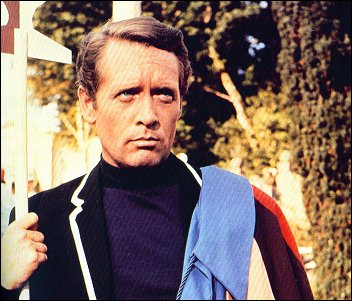 ‘I am not a number – I am a free man!’ Patrick McGoohan cries in the 60s cult-TV series, The Prisoner. McGoohan plays a British spy who is held captive in a village on an island controlled by a faceless authority. The prisoner, known only as Number 6, has resigned from the secret service. It seems to be his crime. In the opening sequence, we see him burst into his spy chief’s office and passionately submit his resignation; he is subsequently drugged, kidnapped, and whisked off to the island. We never find out why he quit.
‘I am not a number – I am a free man!’ Patrick McGoohan cries in the 60s cult-TV series, The Prisoner. McGoohan plays a British spy who is held captive in a village on an island controlled by a faceless authority. The prisoner, known only as Number 6, has resigned from the secret service. It seems to be his crime. In the opening sequence, we see him burst into his spy chief’s office and passionately submit his resignation; he is subsequently drugged, kidnapped, and whisked off to the island. We never find out why he quit.
The authorities on the island are as perplexed we we are. The prisoner is told that he will remain interned on the island until he has explained himself. But the prisoner refuses to do so. Instead, he seeks to escape. Insistently. The prisoner’s whole tenure on the island (the entirety of two seasons of the show) consists of attempts to escape and flee to the mainland.
Captured by the eerie bouncing balls that guard the island, the prisoner is hauled before Number 2 and issued a sardonic dressing down. ‘In a society, one must learn to conform’, Number 2 tells him.
‘I am not a number – I am a free man!’ the prisoner replies. The moment he is alone, he is preparing to escape again.
 We can see The Prisoner as a metaphor for the sixties counterculture. According to the French philosopher Gilles Deleuze (1925-1995), the counterculture was defined by the many ways that groups and individuals sought to escape the society of normalisation and control that their parents’ generation had helped create.
We can see The Prisoner as a metaphor for the sixties counterculture. According to the French philosopher Gilles Deleuze (1925-1995), the counterculture was defined by the many ways that groups and individuals sought to escape the society of normalisation and control that their parents’ generation had helped create.
The driving impulse behind the counterculture was not just to oppose the status quo, it was to get free of it – to head for the horizon with bloodshot eyes on experimental lines of flight (fuite – this can mean leaking, fleeing, or escaping).
Lines of flight are bolts of pent-up energy that break through the cracks in a system of control and shoot off on the diagonal. By the light of their passage, they reveal the open spaces beyond the limits of what exists.
In a series of books written with the militant psychotherapist Felix Guattari (1930-1992), Deleuze linked human creativity to flight. It is our desire to escape the status quo that leads us to innovate. Like the prisoner, we dream of being anywhere but here. We coordinate, form alignments, combine our powers and innovate. We remake the world on creative trajectories.
Deleuze’s idea of lines of flight can help us clear up a common misconception about the sixties counterculture. The counterculture was not fundamentally oriented against mainstream society. It was oriented away from it.
It is true that the counterculture was defined politically by the rejection of the society that existed at the time. The Free Speech movement and Students for a Democratic Society were opposed to US government policies, especially the war in Vietnam. It is also clear that, in the 1970s, the militant end of the counterculture positioned itself against the state in the hope of creating a popular movement to overthrow it. But the counterculture per se was oriented away from mainstream society. Being against was a means, not an end.
This is evident in Woodstock generation, which was driven by the desire for another world and way of life, and inspired by the belief that this world and way of life was possible. Having a ‘countercultural’ attitude and outlook does not necessarily imply that one is hostile towards the mainstream. It signals a desire to leave the society that exists, to leave it to its own devices, and to grow creative (with new devices) with other like-minded people.
The Apple I was hacked together on a creative line of flight. So, by and large, was the internet.
One of the best expressions of countercultural line of flight is the the 1960s and ’70s back-to-land movement. Drop City, in Colorado, was the first of many hippie communities that sought to create a new kind of society. Between 1965 and 1973, thousands of middle class kids, in flight from Mom and Dad, society, the draft, careers, and social conventions of all kinds, came to Drop City and other communes like it in search of freedom and alternative lifestyles.
The culture got by with a minimum of rules. Everything was set up to enable free-wheeling, nomadic lifestyles, which could be recreated or escaped at a moment’s notice. Nomadism, as Deleuze and Guattari understand it, doesn’t require moving around. You can sit still and be a nomad. Nomadism is a way of being. It involves refusing to be tied down by set categories and definitions. It is driven by a desire to experiment and explore, to learn, grow, and boldly venture forth on creative lines of flight.
The hippie experiment collapsed under the weight of its contradictions. Over subsequent years and decades, the counterculture thrived. Today, the counterculture has been absorbed into the system of society – domesticated, to an extent, yet affirmed and enabled at the same time. The corporate mavericks who shake up markets with disruptive innovations create businesses on lines of flight. Each generation of teenagers is encouraged to define a new line of flight, starting with the rejection of the sounds and styles that have come before.
Nomadism is a cultural norm. While plenty of people simply want to ‘fit in’, the best and the brightest want to break out and head for the horizon.
When we look into the future, we dream of a world that is radically different from the one we know today.
We may be stuck in offices, trapped in traffic, tied down by debt or shacked to unhappy relationships. Inside, we are nomads. We are already in flight. The mainland awaits.

Hat dies auf horstbellmer rebloggt.
Reblogged this on Evolutionary Landscapes and commented:
Reblog post of the day goes out to “Philosophy for Change,” a great space I discovered while through a Google search for “Lines of Flight,” a term by philosopher Gilles Deleuze to describe counter-movements to the status quo, or “bolts of pent-up energy that break through the cracks in a system of control and shoot off on the diagonal… It is our desire to escape the status quo that leads us to innovate.” Thought this post some excellent Sunday food-for-thought. What do you think? Does this clarify your understanding of counter-culture and creativity?
Great post here [Says a current reader of Deleuze and Guattari]. Reblogged!
Cheers Jeremy. A Thousand Plateaus and What is Phiosophy? are two of my favourite books. Every time I dip into them there is something new.
the mainland IS the island
Layers within layers. I’ll have to watch the show again.
Reblogged this on Authentic Mover and commented:
Love this: “Nomadism is a way of being. It involves refusing to be tied down by set categories and definitions. It is driven by a desire to experiment and explore, to learn, grow, and boldly venture forth on creative lines of flight.”